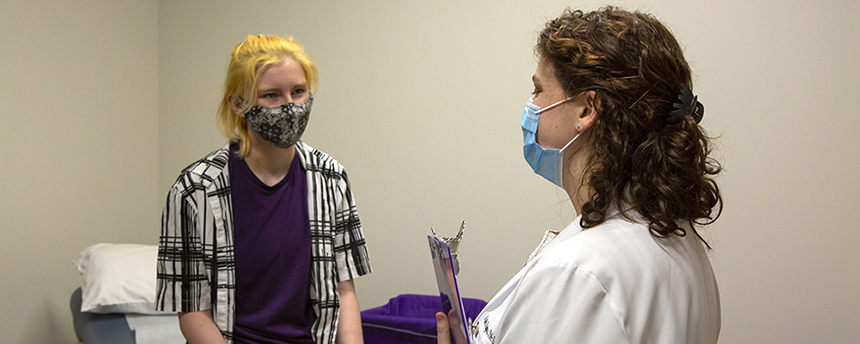
Interprofessional education is guided by four competencies that were developed in 2011 and updated in 2016 by the Interprofessional Educational Collaborative (IPEC). In November 2023, IPEC released the IPEC Core Competencies for Interprofessional Collaborative Practice: Version 3. Key drivers shaping the 2023 version included the need to integrate perspectives from seven new IPEC member organizations and a desire to reflect contemporary research, policy, education, and practice realities. The revised IPEC competencies provide a blueprint for how to prepare learners to engage in lifelong learning and collaboration to improve both person/client care and population health outcomes.
JMU is committed to building curricular and co-curricular activities, that provide students opportunities to integrate knowledge, skills, and values/attitudes that define working collaboratively in interprofessional and interdisciplinary teams, for all students preparing for careers in health and behavioral studies.
JMU CHBS IPE Competencies (Adapted from IPEC 2023 Competencies)
*These competencies were edited to include interdisciplinary language in order to include the various professions and disciplines within the College of Health and Behavioral Studies and are for internal use only.
*The development of interprofessional competencies for education has largely been driven by the health sector. Therefore, the original health-centric language uses words like “patient,” “health care,” “health care teams,” and so on. Because we prepare students for careers in a variety of settings, the language has been slightly adjusted to make it more inclusive of all academic programs of study in CHBS. The citation for the IPEC document with the original competency language is listed below.
For more information, visit IPEC’s website.
Work with team members to maintain a climate of shared values, ethical conduct, and mutual respect.
VE1. Promote the values and interests of persons and populations served in health care, community-based-settings, and/or interdisciplinary endeavors.
VE2. Advocate for social justice and health equity of persons and populations across the life span.
VE3. Uphold the dignity, privacy, identity, and autonomy of persons while maintaining confidentiality during team-based initiatives.
VE4. Value diversity, identities, cultures, and differences.
VE5. Value the expertise of all members of the interdisciplinary team in supporting team functioning and achieving health/project outcomes.
VE.6 Collaborate with honesty and integrity while striving for equity and improvements in individual, community, and/or project outcomes.
VE7. Practice trust, empathy, respect, and compassion with persons, collaborators, and populations.
VE8. Apply high standards of ethical conduct and quality in contributions to team-based activities.
VE9. Maintain competence in one's own discipline or profession in order to contribute to interprofessional and/or interdisciplinary efforts.
VE10. Contribute to a just culture that fosters self-fulfillment, collegiality, and civility across the team.
VE11. Support a workplace where differences are respected, satisfaction is supported, and well-being is prioritized.
Use the knowledge of one's own role and team members' expertise to address individual, community, and/or project outcomes.
RR1. Include the full scope of knowledge, skills, and attitudes of team members.
RR2. Collaborate with others within and outside of the health and service delivery systems to achieve outcomes.
RR3. Incorporate complementary expertise of all team members.
RR4. Differentiate each team member's role, scope of expertise, and responsibility in advancing individual, community, and/or project outcomes.
RR5. Practice cultural humility in teamwork.
Communicate in a responsive, responsible, respectful, and compassionate manner with team members.
C1. Communicate one's roles and responsibilities clearly.
C2. Use communication tools, techniques, and technologies to enhance team function, well-being, and outcomes.
C3. Communicate clearly with authenticity and cultural humility, avoiding discipline-specific terminology.
C4. Promote common understanding of shared goals.
C5. Practice active listening that encourages ideas and opinions of other team members.
C6. Use constructive feedback to connect, align, and accomplish team goals.
C7. Examine one's position, power, role, unique experience, expertise, and culture towards improving communication and managing conflicts.
Apply values and principles of the science of teamwork to adapt one's own role in a variety of team settings.
TT1. Describe evidence-informed processes of team development and team practices.
TT2. Appreciate team members' diverse experiences, expertise, cultures, positions, power, and roles towards improving team function.
TT3. Practice team reasoning, problem-solving, and decision-making.
TT4. Use shared leadership practices to support team effectiveness.
TT5. Apply interprofessional and interdisciplinary conflict management methods, including identifying conflict cause and addressing divergent perspectives.
TT6. Reflect on self and team performance to inform and improve team effectiveness.
TT7. Share team accountability for outcomes.
TT8. Facilitate team coordination to achieve safe and effective care/services, and project outcomes.
TT9. Operate from a shared framework that supports resiliency, well-being, safety, and efficacy.
TT10. Discuss organizational structures, policies, practices, resources, access to information, and timing issues that impact the effectiveness of the team.
Interprofessional Education Collaborative. (2023). IPEC Core Competencies for Interprofessional Collaborative Practice: Version 3. Washington, DC: Interprofessional Education Collaborative.

